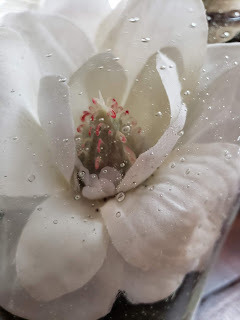What is Thiabendazole and Why Is It On My Fruit?
What is Thiabendazole?
| Bagged fruit |
| nematode photo source: Wikipedia |
Wait, What Is It Again?
Thiabendazole is an anti-worm (anthelmintic) medication. It
is used to treat infections caused by worms (nematodes). Some of the worms it
can treat are pinworm, hookworm, whipworm, roundworm, and trichinosis.
So It’s a Medicine?
Well yes, according to drug.com it is a medicine to prevent
worms from growing and multiplying in the body. This drug can be administered
via oral medication in a singular individual. The fact is that thiabendazole can
be used for many other purposes as well.
So Why Is It On My Bag Of Fruit?
Thiabendazole is considered a fungicide. It is used to
control fruit and vegetable diseases, like things like mold, blight or rot
itself. It has even worked against Dutch Elm disease in trees and contains it
in storage conditions. It can also be put to use in livestock ringworm
incidences.
 |
| This label was on my bagged fruit |
Is It Harmful to Ingest?
It is listed as a slightly toxic pesticide and that a
caution warning should be listed on the label. It is on our fruits and
vegetables because they are fresh when picked and are very susceptible to a
variety of molds/disease that can make us sick if ingested.
Our fruits and vegetables travel for a very long time to get
to the market and into our homes. My example of a clementine bagged fruit label,
that I had purchased at a regular American supermarket, had traveled from the
country of Peru. The antifungal may or may not be combined with a light wax
coating. They are applied after the harvest. The fruits and vegetables are
either sprayed or dipped with either the anti-fungal alone or then a coat of
wax/resin.
Most people would be “turned off” eating very shriveled or
black marked fruit with signs of near rot, and no one wants to take on a worm
in their bodies either. This is the main reason for treating fruits and
vegetables with this chemical. It is not quite known and is often argued about
whether it is harmful long term for humans, but it is considered safe for use
the way it is used. One would have to ingest a very high amount of it to become
sickened by it.
 |
| My lemon from Chile |
What Can We Do?
It is recommended that we wash the hard rinds and the outer skins
of the fruit and vegetables, we are about to eat. We must remember that while
there have been many suggestions for cleansing, it must be noted that Thiabendazole
will not entirely be removed in the washing process, it is thought to degrade
once sprayed on after a short while but it is noted that Thiabendazole is
strong enough to permeate the skin of vegetables and fruits
.
In my research, I have found people even scrub the peels with
dish detergent and then rinse thoroughly! Some homemakers and bloggers use a
mix of baking soda and soapy water to cleanse fruit and vegetables. Here is
what I do:
I will mix 4 parts of water with 1 part of plain white
vinegar in a large bowl. Then I let the fruits or veggies soak for twenty
minutes. Then I rinse well with water.
 |
| soaking my veggies |
List of veggies and fruits that Thiabendazole may be sprayed
or dipped, Apples (after harvest), peaches, snap peas, green bell peppers,
tangerines, clementine, avocado, carrot, sugar beets, plantain/banana,
strawberries, mango, papaya, plums, lemons, limes, mushrooms, potato, sweet
potato, cilantro, collard greens, oranges to name a few.
 |
| every so often I turn over the cucumber so that it soaks evenly |
Other names for Thiabendazole can be Imazalil, orthophenylphenate,
sodium-orthophenylphenate, or mintezol.
My suggestion is that please read your labels when
purchasing all of your food! These chemicals do have to be listed by law. If
you do not want to ingest these fungicides, please remove the peels (may help
lessen the exposure to them some) and finally, the best yet is to purchase from
local area farms or from certified organic growers. Remember to eat fresh
organic foods as soon as possible because they will have no chemical treatment
and this will lessen their shelf life.
Lemon zesting…that’s a hard pass for me! I say sour lemons
to it all!

Comments
Post a Comment